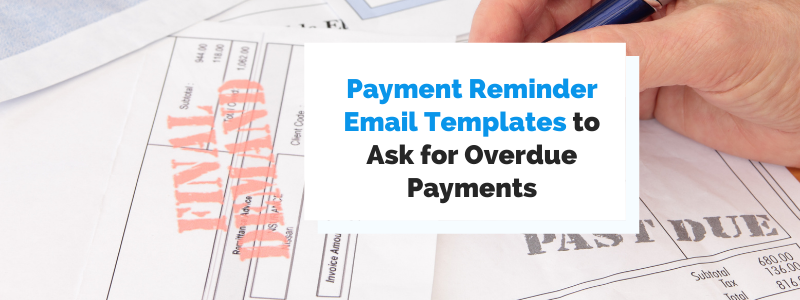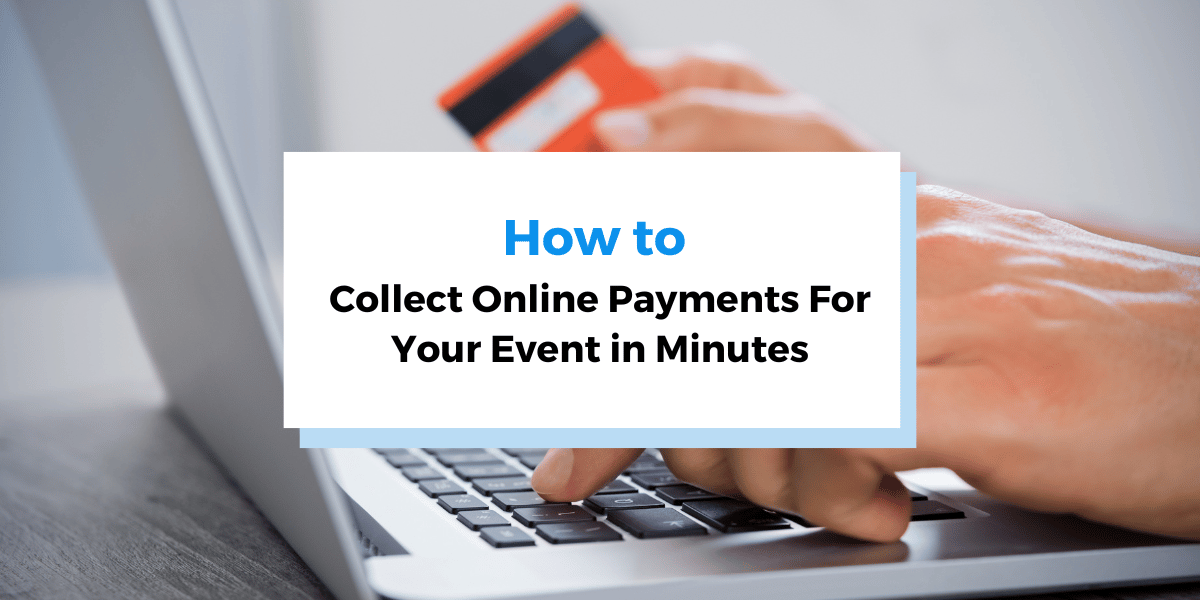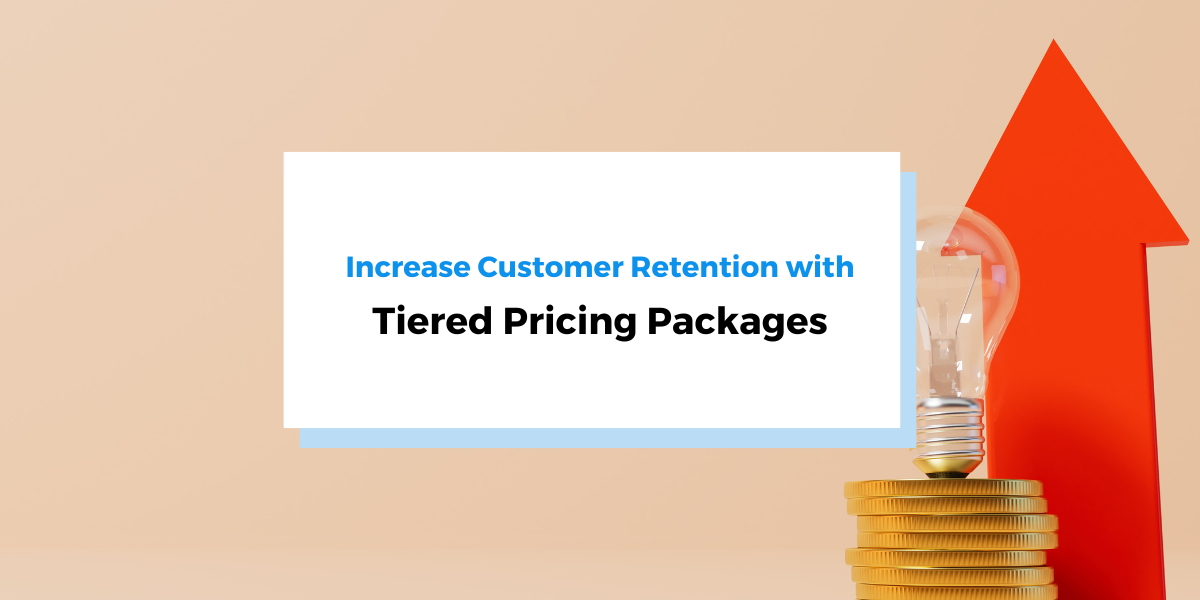As a business owner, you meticulously prepare every invoice, and provide customers with information and payment methods, and what happens? Sometimes, they simply don’t pay on time.
Now you need to remind them of their late payment, but how? How to hit that sweet spot of being firm, yet at the same time polite and professional?
We got your back. In this article, we’re bringing you seven late payment email templates you can use to ask for outstanding invoices. Also, we’ll show you what to include in your payment reminder emails and give you some pointers for managing them.
Jump to section:
What to Include in Late Payment Emails
Late Payment Email Templates
How to Better Manage Sending Late Payment Reminders
What if Email Reminders Don’t Work?
What to Include in Overdue Payment Reminder Emails
In addition to a carefully worded message, an effective payment reminder email should contain several key elements.
The first thing to pay attention to is also the first thing your customer will see in their inbox—the subject line.
There are two elements that you should fit into a subject line. One is the mention of the invoice that your customer needs to pay, and the other is the name of your business.
Combined, these two should ring a bell for your customer, making sure they know exactly who is asking for the payment, and which service or product they should be paying for.
The subject line could, therefore, look something like this:
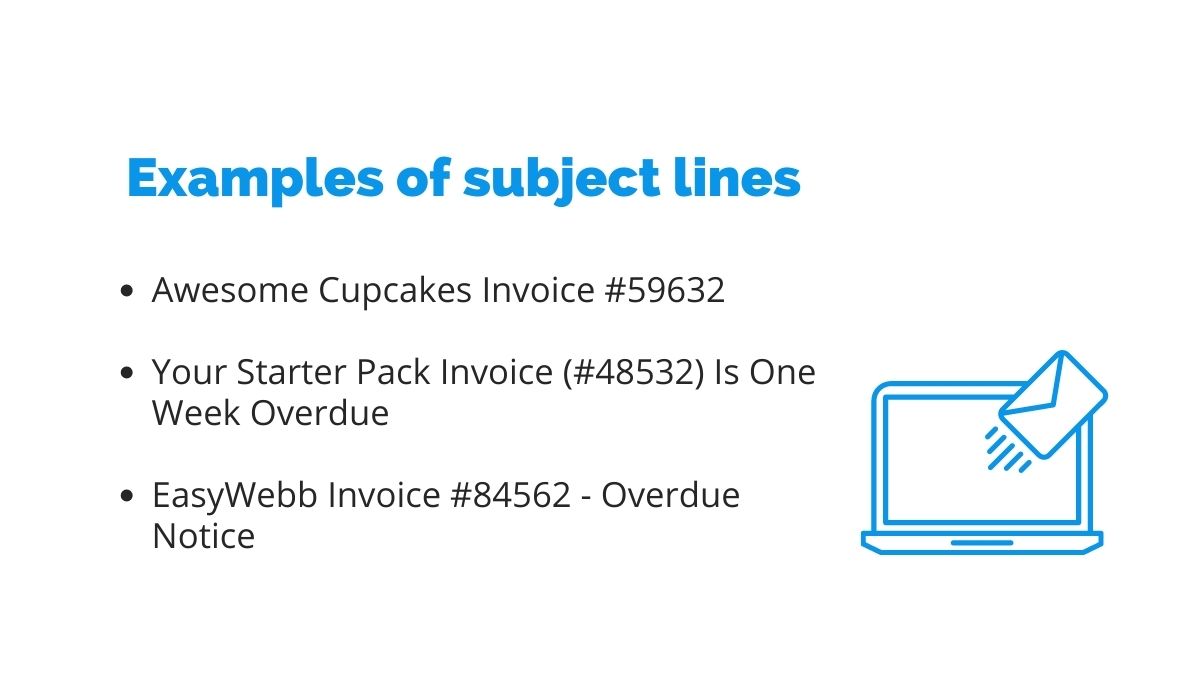
Source: Regpack
To make the email even more attention-grabbing, consider adding a word that invokes urgency.
Making sure the subject line contains words like “overdue”, “late”, “urgent”, “important”, or “critical”, is an excellent way to attract the recipient’s attention and receive timely payment.
Moving on, when the customer opens the email, they should find the due date and the outstanding balance in the body. Those are critical pieces of information needed for payment, so don’t make them difficult to spot.
Of course, the due date refers to the due date for the original invoice. Therefore, the customers can see in the reminder email how long it has passed since.
Along with that, there’s the amount they owe you; if the overdue invoice email is for an invoice that should have been paid a month or more ago, it can also include the late fees.
The late payment email should also include the payment options you provide to your customer.
Make it easy for them to pay by including, for instance, a direct link to a payment portal if you use it, a physical address for sending a check, or whatever other method you think they prefer.
The more methods of payment you include, the better the chances you’ll get your money on time.
Another element you can include in the overdue payment email is a specification of the next steps in the billing process.
That’s especially suitable for emails that refer to very late payments; you can include a gentle reminder of additional fees, pursuing legal action, and other consequences that you have in place.
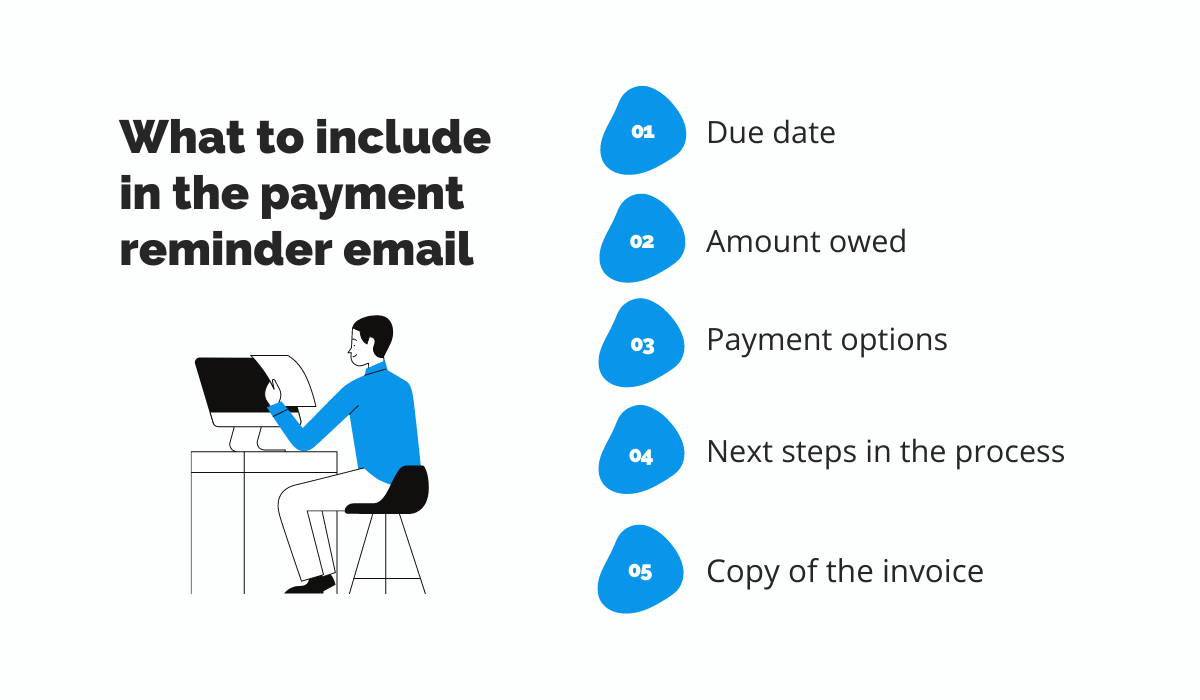
Source: Regpack
For convenience, it’s a good idea to attach a copy of your invoice to every overdue payment reminder email. That way, the customer can access it immediately, without rummaging through the piles of messages in their inbox.
In addition to the elements we’ve mentioned in this section, there is one more essential aspect of an effective late payment email—what you actually write in them.
We’ll see the various possibilities for what to put in the body of the message in the next section, where we’ll provide you with payment reminder email templates.
Late Payment Email Templates
How you write a late payment email could make a difference between being compensated for your work and not receiving your hard-earned money.
For example, the reminder email you send on the day the payment is due won’t be formulated in the same way as the one you send two weeks after the payment deadline, and especially the one you send two months later.
There should be differences in tone, wording, and content of every reminder email.
That’s why we’ll provide you with payment reminder email templates for every stage of asking for overdue payments. If you use them, the whole process will be much easier.
On the Day the Payment Is Due
The email you’re sending on the day the payment is due is your customer’s first call to action. With that in mind, try to keep it brief and casual.
Remember, the customer isn’t late with their payment at this stage, you’re merely giving them a friendly reminder.
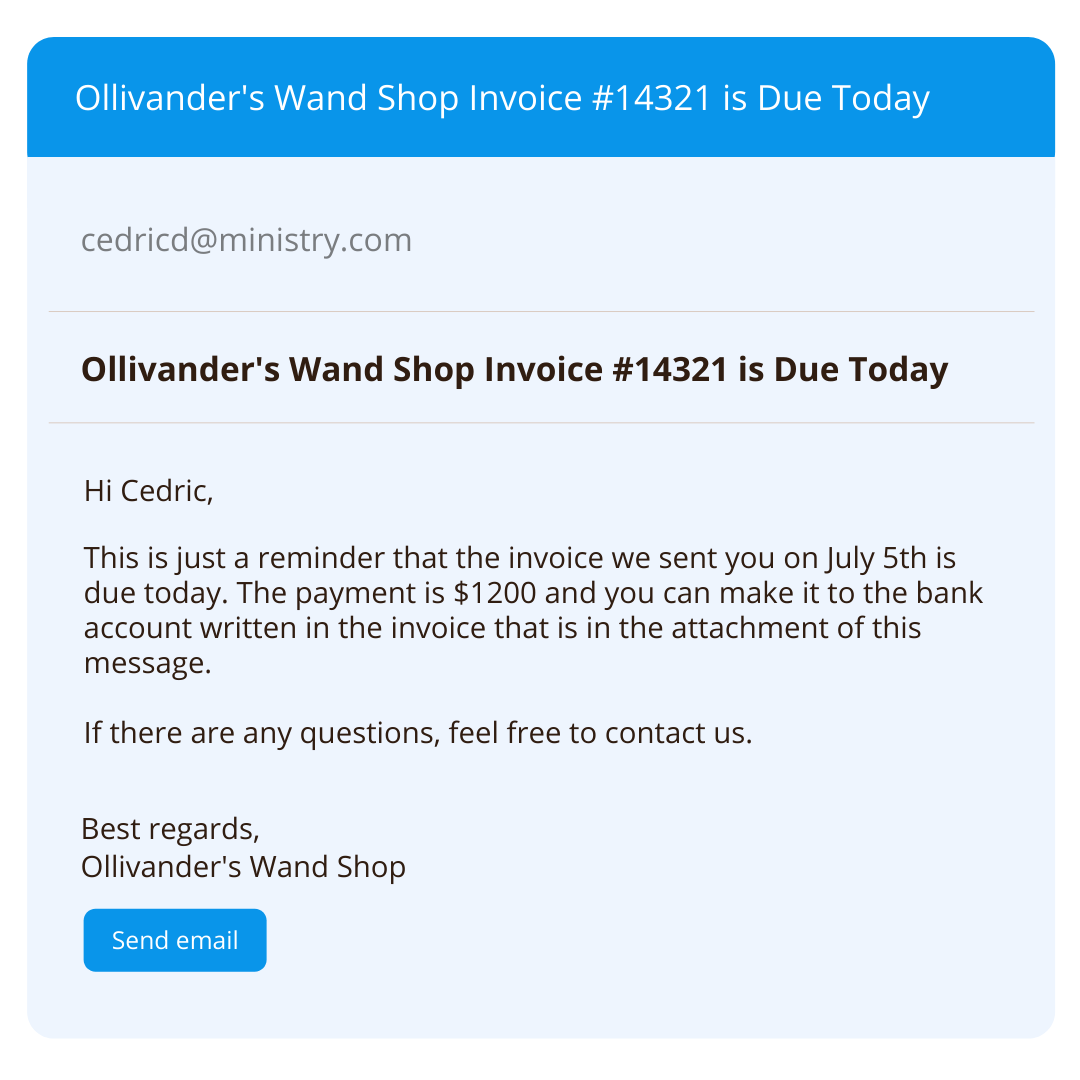
Source: Regpack
As you can see in the example, this payment reminder is light in tone, short and straightforward.
The subject line contains the company name and the invoice number, plus the phrase “due today”, which is a gentle nudge for the customer. We’ll keep a similar subject line in all of our emails and change the intensity of the urgency phrase.
The email itself lets the customer see how much they owe, when the money is due, and how to pay. There’s no need for anything more at this stage; after all, the payment isn’t actually late yet.
One Week After the Late Payment Was Due
This is the first email after the due date has passed. The purpose of this message is to remind your customer their payment is now overdue and to provide them with all the information they need for the payment so they can have it at hand.
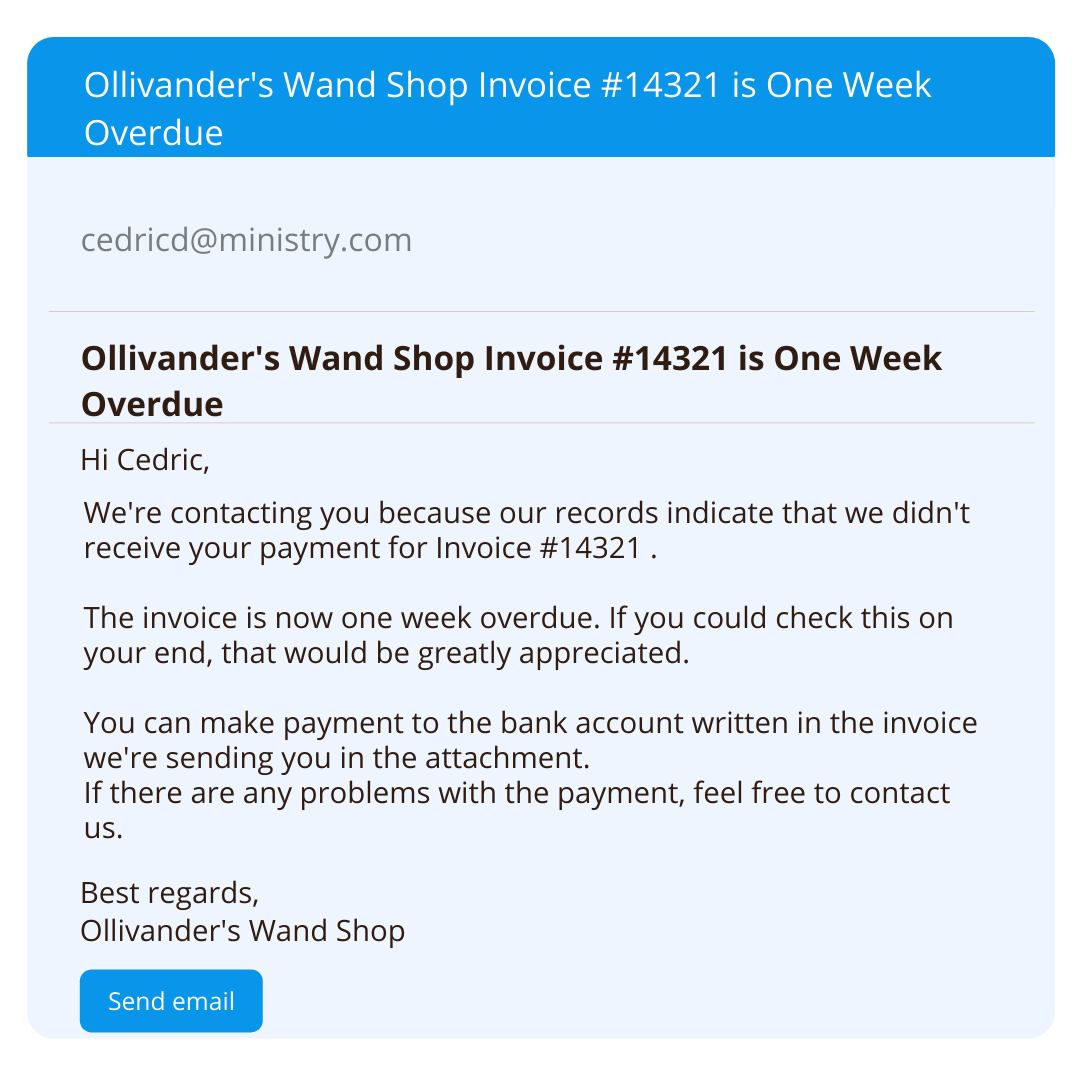
Source: Regpack
In this email, you should still keep a polite and friendly tone, yet one that is slightly firmer than in the previous one. After all, the payment is now officially late, and the customer owes you money.
If you didn’t do it before, now is the time to include all the details necessary for payment and a copy of the invoice.
Also, it’s important not to be accusatory. There could be a lot of reasons for late payment, and there’s no need to assume that the customer is purposely holding on to your compensation.
Two Weeks After the Overdue Payment Was Due
If two weeks passed from the due date and the customer still hasn’t paid the invoice, it’s time for a follow-up email. The situation is not alarming, but you can now be even firmer in your tone.
Below is a payment reminder email template you can use for modeling your own.
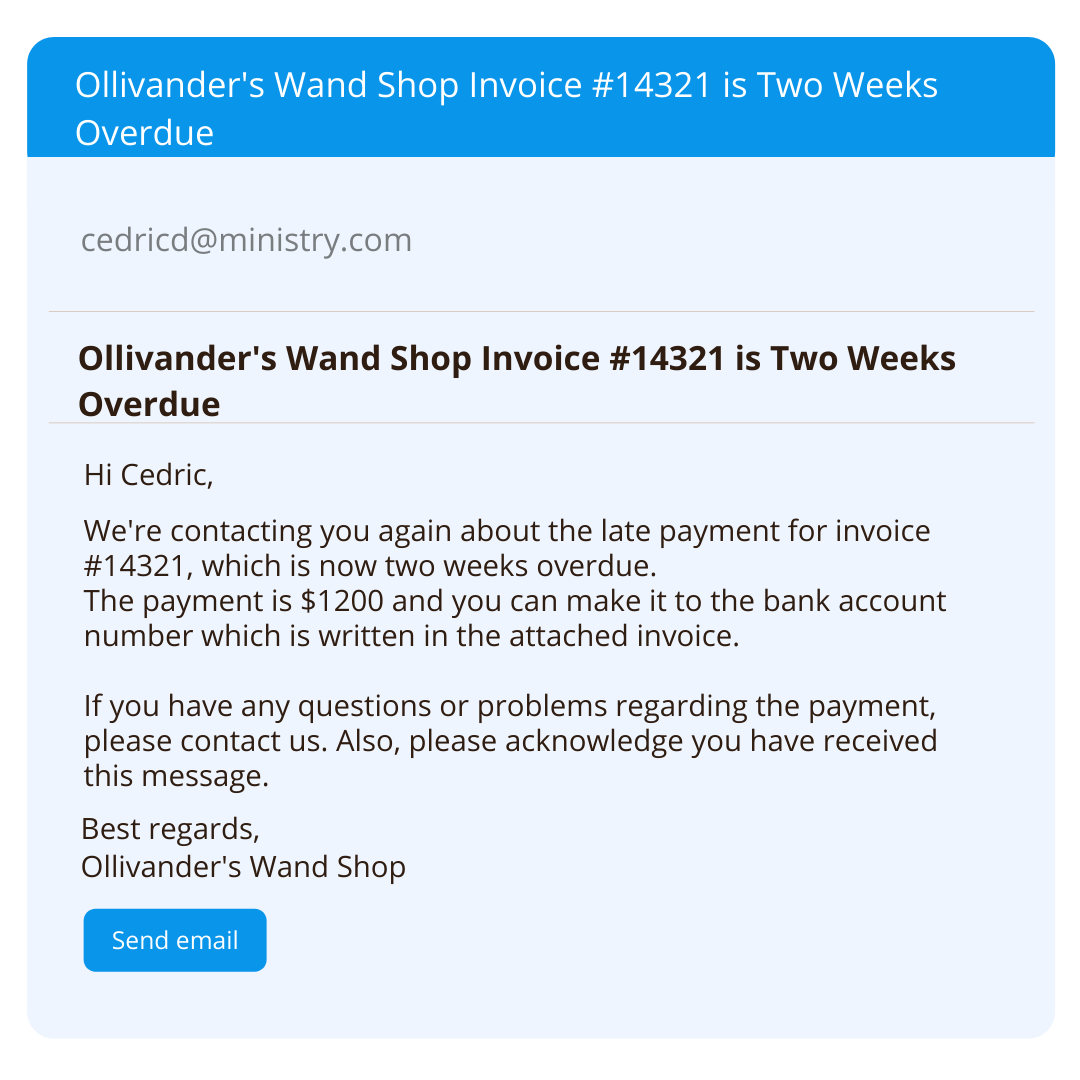
Source: Regpack
As we’ve mentioned earlier, you can be more direct in this email. Let your customers know that this is not the first reminder you’re sending them.
Don’t forget to include the payment details like the amount and the information about the payment options. You can include those in the invoice; just make sure that you’ve attached the invoice to your message.
Besides that, it’s a good idea to ask for confirmation of receiving the email to ensure that someone on the other end is reading your payment reminder message.
One Month After the Late Payment Was Due
One month is a significant amount of time in terms of late payments. If the customer hasn’t paid by then, and you know that they’re receiving and reading your emails, there’s almost certainly some kind of problem on their end.
That being said, you still have the right to request compensation for your work and to remind them again of their obligations.
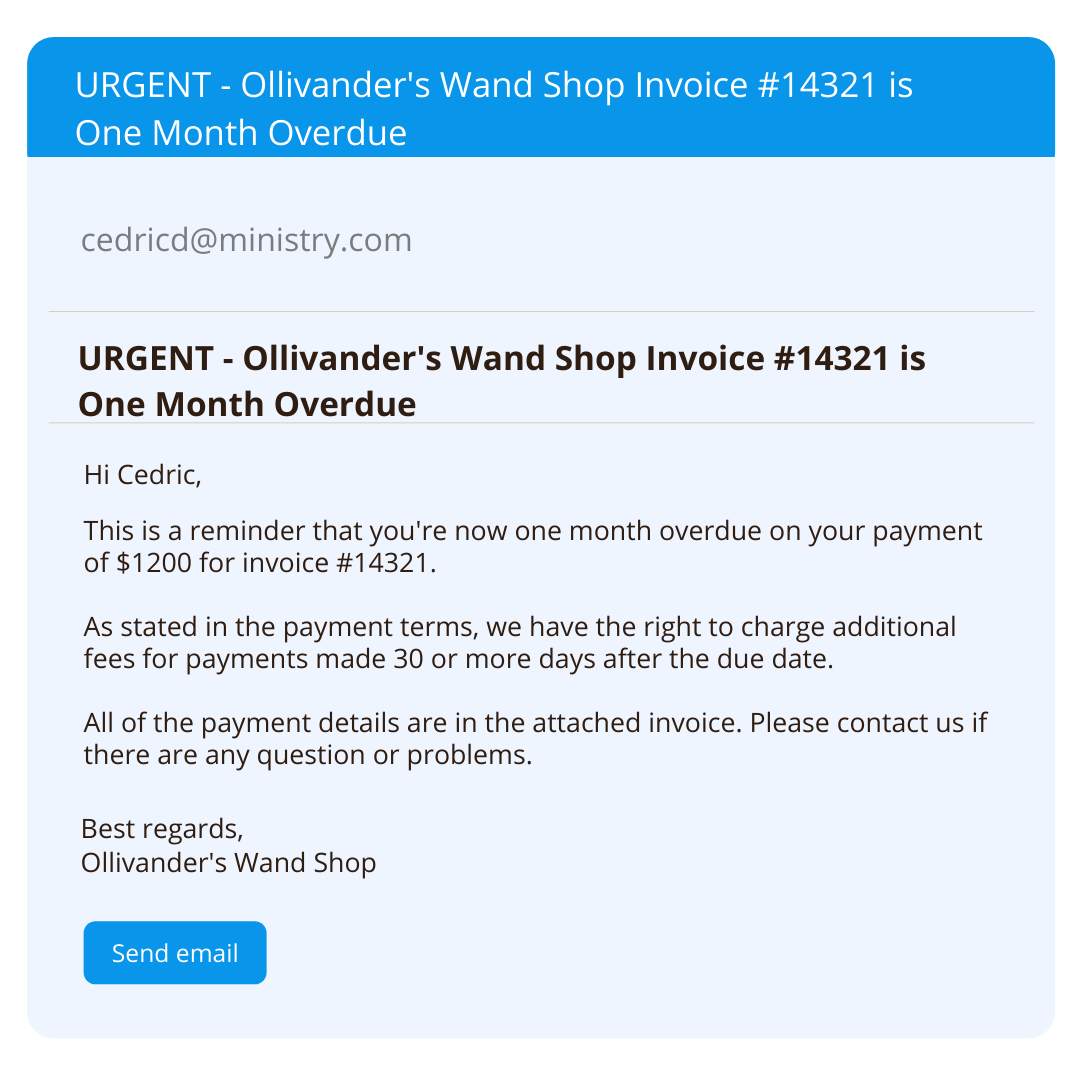
Source: Regpack
As we mentioned in one of the previous sections, you can include words that invoke urgency in the subject line to draw your customer’s attention. In this template, we used “urgent”, but you can opt for “important”, “attention”, “ASAP”, or any other that you see fit.
Furthermore, you can mention your terms and conditions regarding payments. The template above, for example, states that additional fees are charged after a month from the due date.
Whatever terms you have in your invoice, remind your customer about them to make them think twice about prolonging the payment any further.
Two Months Overdue
When the payment is two months overdue, you can be transparent and direct with your customer without hesitating. However, it’s key to remember that you still need to remain professional and calm.
Here’s a template you can use to email your late-paying customer.
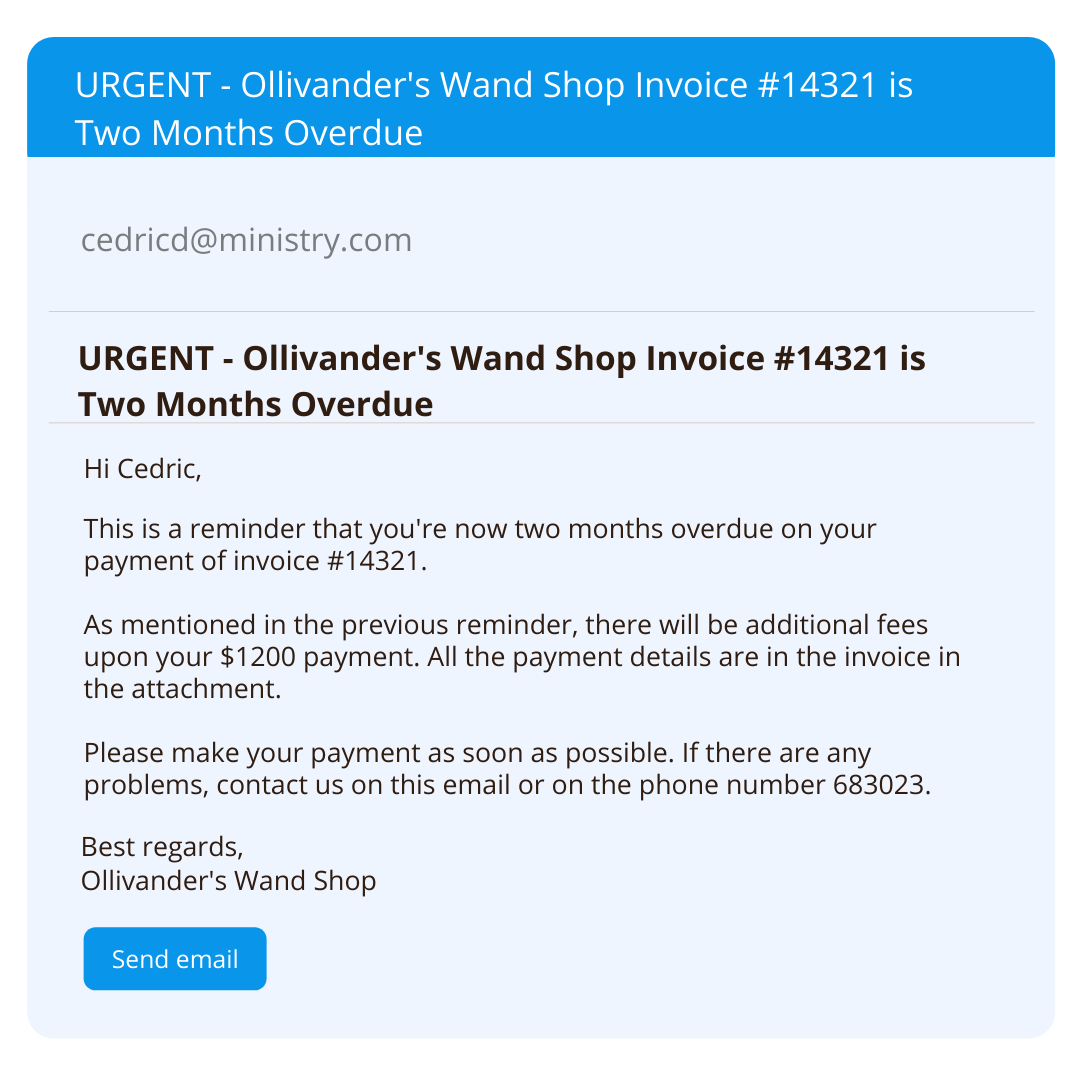
Source: Regpack
Be sure to warn your customers of the additional charges that will result from their leisurely approach to payments—of course, if you have them in your payment terms.
You can also include other contact information besides replying to the email, for example, the phone number. That way, you affirm that you’re available for communication while indicating that they have no excuse for ignoring your payment reminder emails.
Overdue Invoice Reminder Email for Extremely Late Invoices
Anything after two months of being late on payments can be considered extremely late. There’s still hope of collecting your payment, but this should be the last reminder email before you start mentioning the legal action that you will be taking against the customer.
Therefore, let your customer know that the current situation is untenable. Here’s a template that will help you set the right tone.
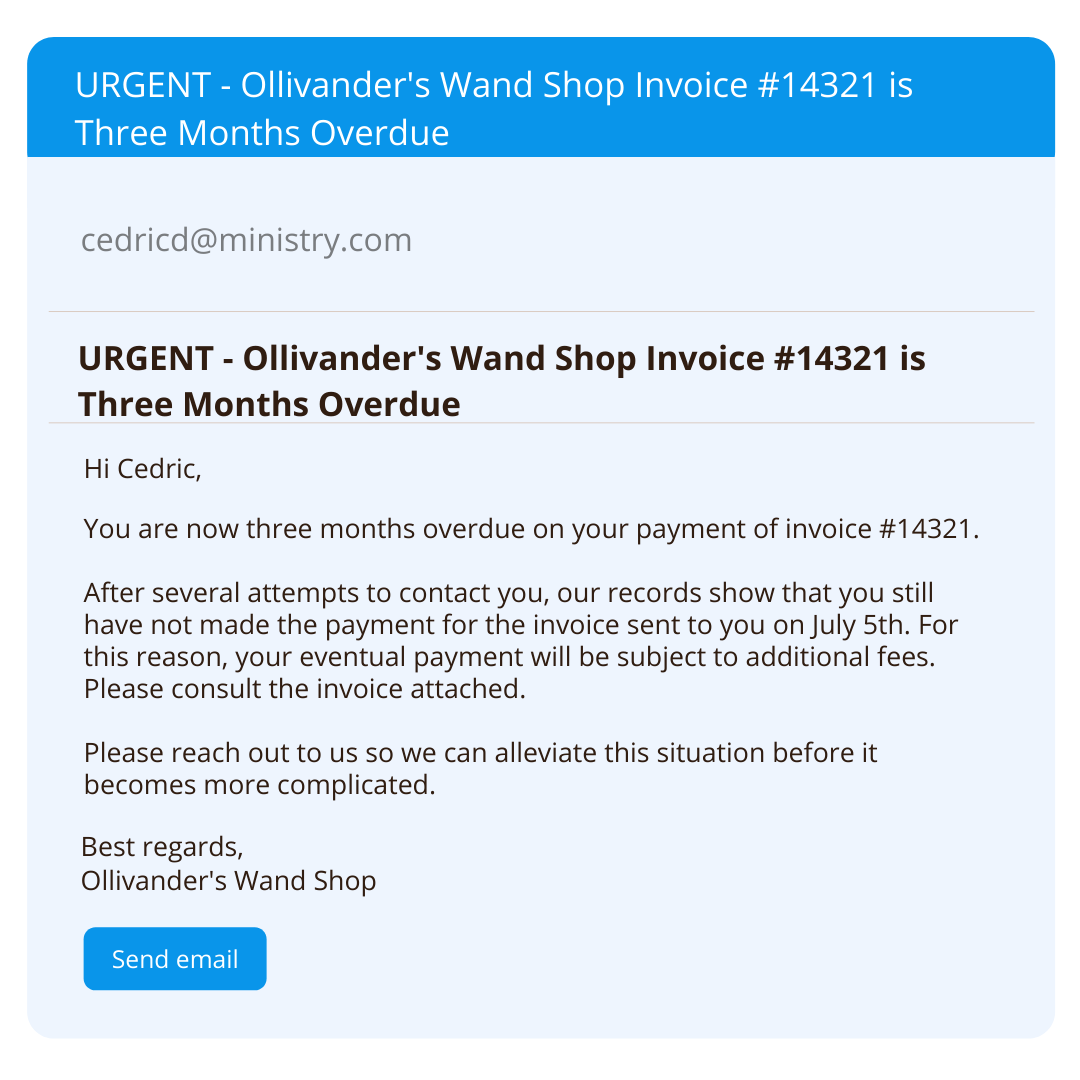
Source: Regpack
In this email, it’s a good idea to be clear about your previous unsuccessful attempts to contact your customers and remind them that there’s still a chance of salvaging this situation and your relationship.
You can leave the specifics of the legal action you plan to take for the final email, but give the customer a hint that this is still something that you two can work out without escalating. In the end, litigation will complicate your life, as well as theirs.
Final Notice Before Sending to Collections
It’s up to you to decide when enough is enough and when to let the collections agency handle your customer’s debt. However, keep in mind that if it’s been more than three months since the due date, it’s highly unlikely that the customer will pay on their own.
As a last resort, you should still send a final payment reminder email to let your customer know what will happen next. The email can look something like the one below.
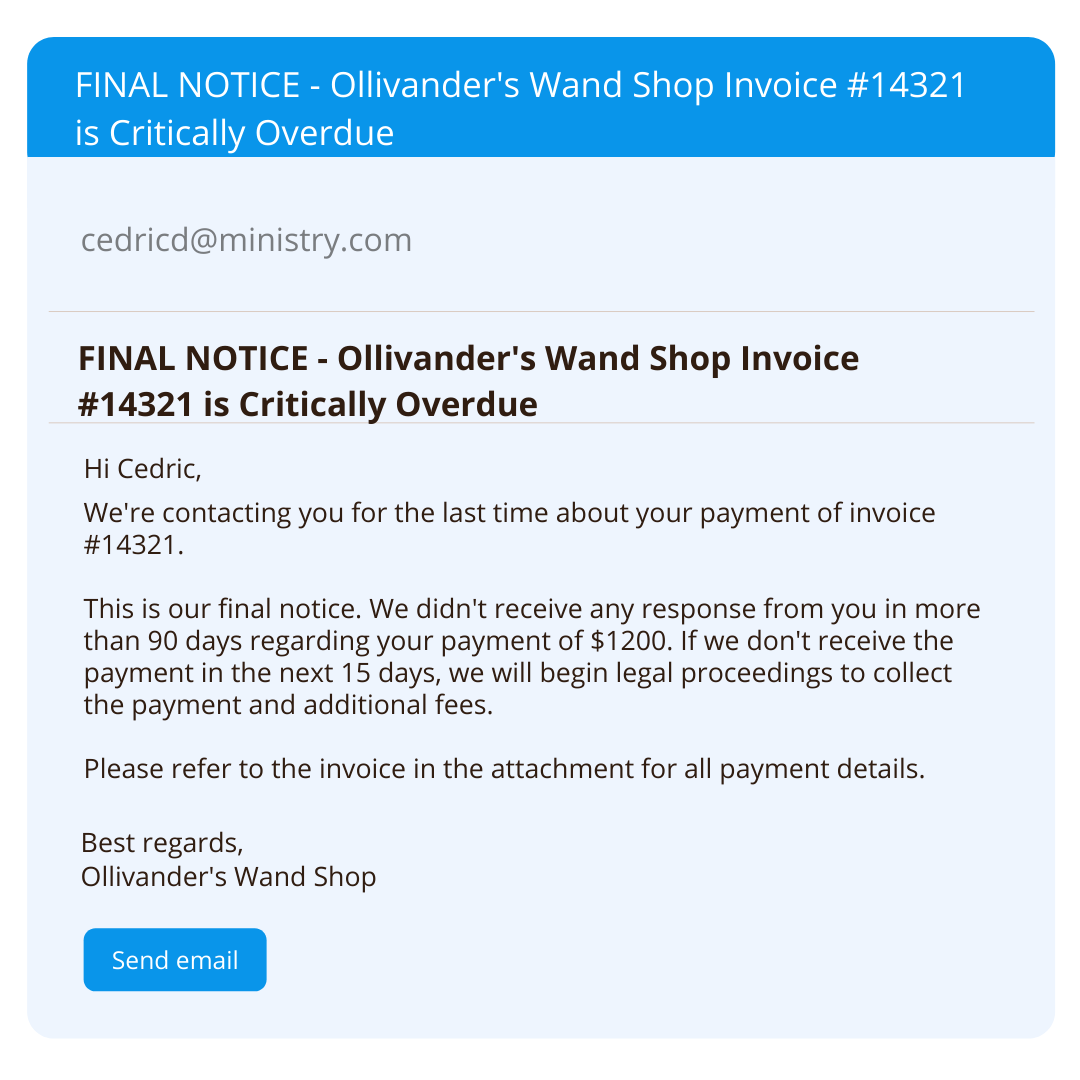
Source: Regpack
The most important part of the final payment reminder email is letting the customer know that you’re looking into available legal means to collect your payment.
A threat of legal action is usually enough to nudge even the most stubborn customers. And if that doesn’t work, it really might be time to start the process of collecting your payment in another way.
How to Better Manage Sending Overdue Invoice Email Reminders
As we’ve seen in the previous section, there’s a lot to keep in mind when sending late payment reminder emails. You have to be on top of the sending schedule, know what to include in the email, and how to write it.
In other words, you need to efficiently manage sending those reminders.
Manually writing and sending payment reminder emails can take a lot of time and effort. The data from an Adobe survey illustrates how much time slaving over emails can eat up.
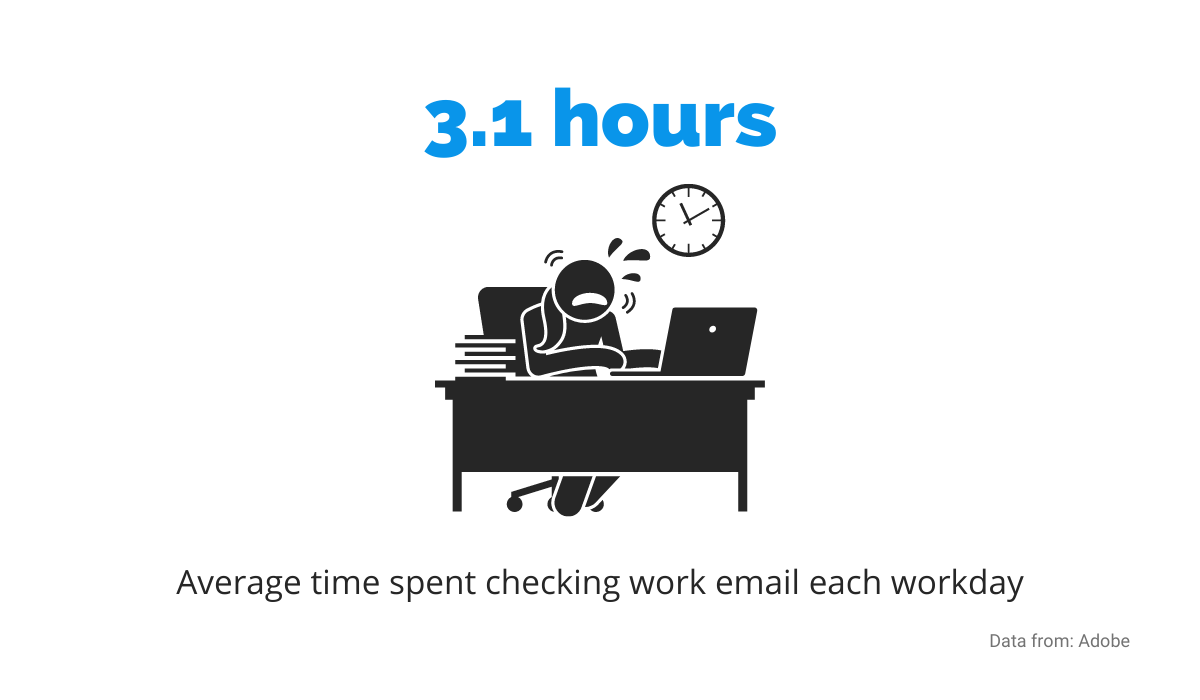
Source: Regpack
In addition to being a tedious time-waster, manually managing emails often leads to errors, which can be costly.
For example, an accidental error in the invoice, the wrong email address, or a mistake in writing the payment terms could potentially prolong payments, complicate the whole payment process, and impact your cash flow.
To avoid that, you need a person whose focus will be entirely on managing overdue payments and payment reminder emails, which takes resources. Even then, there’s no guarantee that everything will go smoothly since everyone sometimes makes mistakes.
The solution can be to automate the process of payment reminders. With automation, many of the aforementioned problems, like time wasting and errors, are taken out of the equation, and the process is faster and more efficient.
For example, Regpack has features that let you automatically communicate with your customers.
You can write payment reminder emails and set triggers for them; for instance, if the customer is one week late with the payment, Regpack can automatically send a prepared email.

Source: Regpack
Also, it offers a dashboard with all the information you might need, like the payment history and balance due. Furthermore, the email reminders are personalized based on the information collected in the registration process.
All that amounts to an efficient, precise, and reliable solution for managing payment reminder emails, which can save you time and resources, as well as improve your relationship with your customers.
What if Email Reminders Don’t Work?
So, you’ve sent a bunch of payment reminder emails to your customer, and there’s still nothing with their name on it in your bank account. Even then, you have some options to consider.
For example, you can try to get to the bottom of the issue by contacting your customer via a different method. Provided you have that option, call them on the phone and try to speak directly with the person responsible for handling payments.
Or if your client is a larger company, you may find you have been sending payment reminder emails to the wrong department or person, or perhaps the people responsible are disorganized and under the impression that someone else in their company would handle your requests.
If you don’t ask, you’ll never know.

Source: Regpack
If you decide to contact them by phone, don’t unload a barrage of accusations as soon as someone picks up. Stick to the tone of your reminder emails and be professional, and polite, but firm.
Remember that this is business and nothing personal, so it’s nothing you should get upset about.
Another course of action is simply to follow through on your claims from the last reminder email you sent the non-paying customer and proceed with legal action.
Hiring a collection agency most likely means that you’re beyond the point of no return regarding the relationship with your customer.
However, it’s not your fault—you have every right to demand full compensation for your work.
The last step is going to court with your customer. If the amount they owe you is significant, that’s the move you should consider; otherwise, you might think about writing that debt off and leaving the whole episode behind.
Most of the time, carefully crafted payment reminder emails will produce results. However, if you come across a customer who simply won’t pay for your work, you can use advice from this section to your advantage.
Conclusion
Handling late payments isn’t easy or pleasant. Although you know you have every right to request the money you’ve earned, it still doesn’t come naturally for most people.
That’s why you mustn’t leave anything to chance when it comes to payment reminder emails. From the first to the last, they need to be carefully written and include everything necessary to resolve the situation.
Email templates we provide in this article can help leave personal feelings out of the process so that you’re a model of professionalism.
By doing that, you improve the chances of getting your compensation and retaining the relationship with your customers.


